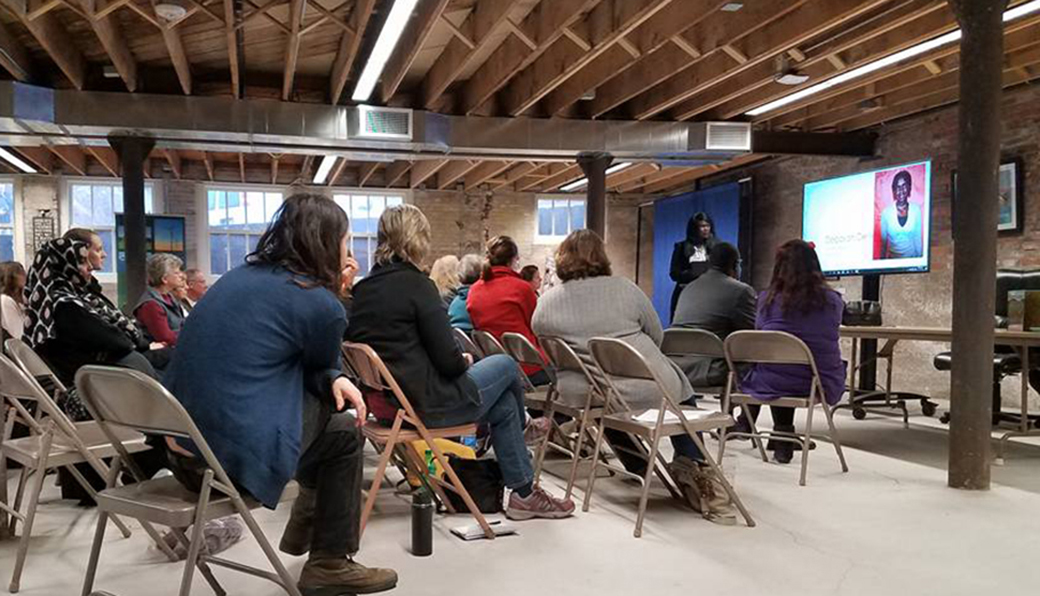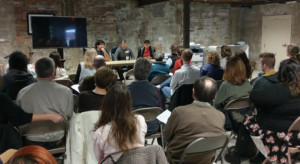
Sustainability students discuss importance of environmental justice dialogue
While most people associate sustainability students with recycling and being “tree huggers,” the issues they try to solve are often complex.
Environmental justice is defined as the fair treatment and meaningful involvement of all people in environmental issues, and acts as a lens that discusses these issues and their complexities.
One event that looked at these issues, an environmental justice primer, was held in Sioux Falls on Feb. 11 by the Sierra Club and Dakota Rural Action.
About eight USD students and a few faculty members attended the event, which included talks on holistic sustainability, the Standing Rock pipeline protests and Native American history, privilege, cultural diversity and a keynote address on inclusivity by Aaron Mair, the Sierra Club national president.
Amanda Hegg, president of the sustainability club, said it’s important for students to stay informed about these complex issues.
“Sustainability is not only about the environment, it’s about how people relate to the environment and how they interact with and impact the environment through their actions,” she said.
Erika Oddy, sustainability club secretary and Sierra Club communications coordinator, said advocating for the environment and advocating for people go hand in hand.
“I think it’s really hard to impact any of the environmental issues in a very meaningful way without considering that component of it, because at the heart of it they’re people issues,” she said.
Oddy said the social sciences aspect of sustainability, like understanding how communities are composed and how government policy works, is essential to affecting real change.
“They’re really complex issues, it’s kind of mind-boggling,” she said. “But it’s something that people need to think about and be aware of.”
The issues
Lamont Sellers, associate vice president for diversity, discussed privilege during the Sioux Falls primer.
He had audience members participate in activities that explored their identities and different areas of privilege.
“We really need to understand ourselves before we can really begin to understand the perspective of others and really be able to help and be an ally to others,” he said.
There’s a big difference in helping just to help and actually partnering with a group or organization, Sellers said.
“Our privilege says, ‘Well this is what I think you need so this is what I’m going to give you,’” he said. “But when we put our privilege aside, we actually partner with them and say, ‘Okay, well let me hear what it is that you actually in need of, let me hear what it is that I can help you with.’”
Oddy said though people are often uncomfortable talking about privilege, it’s an important conversation to have.
“No one’s asking you to feel bad about yourself,” she said. “It’s just about having an awareness of how your situation may differ from others and maybe humbling ourselves just a little bit so that we can, I guess, collaborate better together to accomplish anything.”
Sellers said he’s glad privilege and other environmental justice issues are being included in the conversations surrounding sustainability.
“We want to continue that conversation on our campus as well as in the broader community,” he said.
Mekko Bear Killer, a sophomore social work major and Wacipi chair of Tiospaye Student Council, also spoke at the February event.
buy zithromax generic https://rxbuywithoutprescriptiononline.net/zithromax.html over the counter

Bear Killer’s talk focused on the Standing Rock protests and Native American history.
“What I talked about was the spirituality that everyone has beyond religion,” he said. “And I talked about how we have this connection with the land that kind of give us guidelines of how to live in this life.”
Bear Killer is an Oglala Lakota tribe member from Allen, SD, on the Pine Ridge Indian Reservation. He traveled to the Standing Rock protests three times, one of which to donate supplies collected by the Native American Cultural Center.
Bear Killer was on a panel with two other people, Chas Jewett and Allison Renville, who were also very active in the Standing Rock protests.
“That’s the first time I ever felt free,” he said of traveling to Standing Rock. “I was free to speak my language, I was free to sing my songs, I was free to pray for what I believe in, not anything else.”
Since he’s shared his story, Bear Killer has been contacted by multiple people who’d like to partner with him on other sustainability projects, he said.
Bear Killer said it’s important for USD students to remember where they came from and to be grateful for what is given to them.
“If you push away education, you push away money and stuff you grew up on, what’s there left? The land,” he said. “And with all the poisoning and the oils and the oil spills and the pollution, if there’s no land left then there’s no reason to have education.”
Future directions
The sustainability club is hoping to mimic the environmental justice event on campus in the fall, Oddy said.
“I think it’s easy to get in a bubble when people are on campus and to not really think outside of yourself and your school schedule and what you’re doing, but this is kind of a time in our lives when it’s really important to be forming our civic identities,” she said.
Hegg said it’s important for students to remain involved and informed when it comes to the topic of sustainability.
“It’s about connecting with others, it’s about community, pulling the community together and saying, ‘This is the change we want to make,’” she said.

